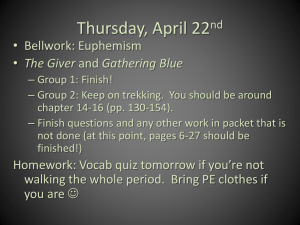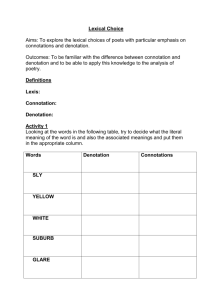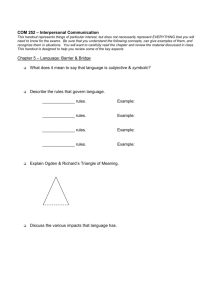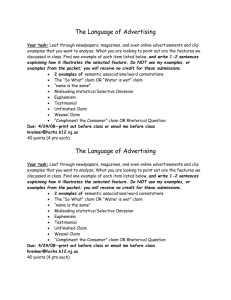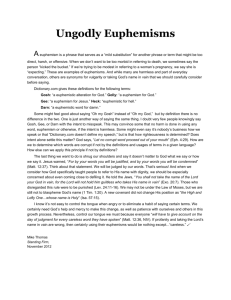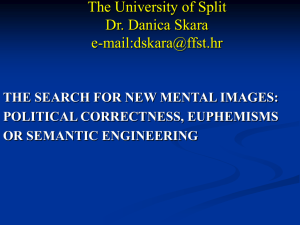Fallacies of Language Trickery
advertisement
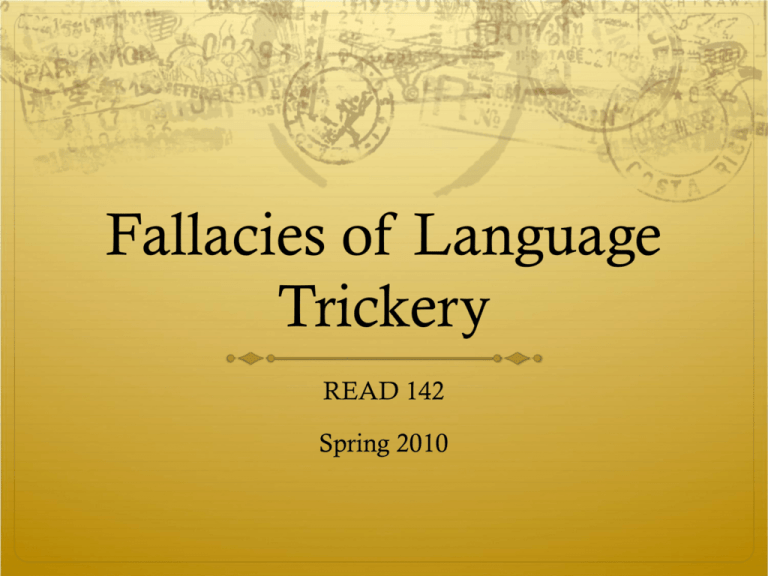
Fallacies of Language Trickery READ 142 Spring 2010 Today’s Agenda 1. Go over midterm. 2. Discuss “Guns in Montana.” 3. Fallacies of Language Trickery 4. Group Planning Time: More databases Let’s count off from 1-6. Deceptive Language So far, we have talked about several logical fallacies. Today, we are going to talk about how fallacious arguments can be based on an inept use of words or a purposeful selection of words that are vague, ambiguous, and prejudicial. Denotation vs. Connotation A writer’s word choice, or diction, are carefully chosen to create an effect. DENOTATION - dictionary definition of a word CONNOTATION - emotional association a word conjures up Denotation vs. Connotation Dictionary definitions show us the agreements that society has made about a word’s meaning. The connotations of a word are its associative meanings, which can be positive, negative, or neutral. These associations can take the form of feelings, ideas, images, or thoughts. Example: How do these words differ? cheap fibbing thrifty lying stingy providing disinformation frugal misspeaking falsifying Let’s practice. What’s the difference? chubby vs. plump assertive vs. aggressive childish vs. childlike lurk vs. hide faux vs. fake In your groups, provide the denotative meaning and connotative meaning of the following words: 1. Republican 2. Democrat 3. Homeland Security 4. 9/11 5. U.S.A. 6. Health insurance 7. California Question A week after the September 11, 2001, attacks, President Bush wanted Americans that this “crusade, this war on terrorism, is going to take a while.” Why did Bush receive criticism for using the word “crusade”? What does the word connote to Muslims? What does it connote to Westerners? Is there bias in these captions? Looters carry bags of groceries through floodwaters after taking the merchandise away from a wind damaged convenience store in New Orleans on Monday, Aug. 29, 2005.' Two residents wade through chest-deep water after finding bread and soda from a local grocery store in New Orleans . . .' Questions about Captions What do the words “looters” and “residents” connote? How are the two words similar in their denotative meanings? Do you think there is more behind the captions? 3 Types of Fallacies 1. Word ambiguity 2. Misleading euphemism 3. Prejudicial language Word Ambiguity a key word with several meanings is left undefined. As a result, the reader must assumed what meaning was intended. tries to gain an unfair advantage by using words the might confuse others and lead them to agree with a claim they don’t fully understand. Examples And where are all the jobs that welfare mothers are supposed to get? Even a burger joint wants you to work evenings and weekends, times when there is virtually no childcare. “Virtually no”: Few childcare options? Few babysitters want to work then? Better Argument And where are all the jobs that welfare mothers are supposed to get? Even a burger joint wants you to work evenings and weekends, times when there is virtually no childcare. Elaborate on limited job choices High costs of childcare for a single mother In your groups, identify the ambiguous words. 1. All ingredients in this ice cream are natural and nutritious. 2. These pies are made from locally grown cherries and have that old-fashioned country taste. 3. The federal government has too much power. 4. Religion enslaves people. 5. You should be willing to do anything for love. 6. You can save as much as 1 quart of oil a day. 2. Misleading Euphemism Euphemism An inoffensive or positive word or phrase used to avoid a harsh reality A tactful word or phrase, an expression used out of concern for the feelings of someone else Words used to avoid directly discussing a topic subject to a social or cultural taboo George Carlin on Euphemisms http://www.youtube.com/watch?v=KITIt2O3Z8Q Examples “I’m sorry your father passed away” instead of “I’m sorry your father is dead.” Jane is “involved with” or “sleeping with” her manager. “I have to go to the restroom.” Euphemism becomes misleading . . . When it is used to mislead or deceive 1984, U.S. State Dept. changed “killing” to “unlawful or arbitrary deprivation of life” to avoid discussing the situation of government-sanctioned killings in U.S.supported countries Military Euphemisms Ziploc or body bags Plastic container for corpses Friendly fire Shooting our own soldiers by mistake Black ops Officially unsanctioned activities such as kidnapping or assassinating enemy leaders In your groups… Come up with a misleading euphemism. 3. Prejudicial Language Word choice that is biased or distorted Also known as “slanted” words Examples Cultic America: A Tower of Babel. They tend to be small, scattered and strange. 1. What are the connotations of the italicized words? 2. What slant do the lend this information? 3. What associations do you have with the words “cultic” and “Tower of Babel”? New Religion in America: None speak the same language. They tend to be small, scattered, and unfamiliar to most of us. Examples Crying for the Thugs 1. What are the connotations of the underlined word, 2. What slant do the lend this information? 3. What associations do you have you have with the word “thug”? Haitian Leader Weeps During Funeral for His Police Pick out the words that could create a bias. Cultic America: A Tower of Babel If the cult watchers are to be believed, there are thousands of groups out there poised to snatch your body, control you mind, corrupt you soul. Witches’ covens, satanic rituals, Krishna consciousness, fanatic fundamentalists, black and white supremacists, New Age cosmic crazies—few are armed but most are considered dangerous. They’ll seduce you and fleece you, marry and bury you. (Newsweek, March 12, 1993) Activism Drowns Out Academia Camping illegally in front of the chancellor’s building, with six star students engaging in a hunger strike, UC Berkeley Ethnic Studies students came across as such know-it-alls, it’s surprising they think they need an education. If you thought ethnic studies was not a scholarly field, but a platform for angry kids with an ax to grind, you wouldn’t walk away disappointed. Debra J. Saunders, San Francisco Chronicle, 5/7/99 Task You are your partner are will receive the front page of from two different newspapers. There is one story that is the same. Without showing each other, jot down how the word choices and the content differ. Headline Comparison Newspaper 1 Word choice Content Newspaper 2 Do you find any examples of the following? Word ambiguity Misleading euphemisms Prejudicial or slanted language Final Thoughts These passages persuade mainly through evaluative word choices. As a critical reader, your task is to separate word choice from word meaning and thus detach from the emotional power of word connotations.
